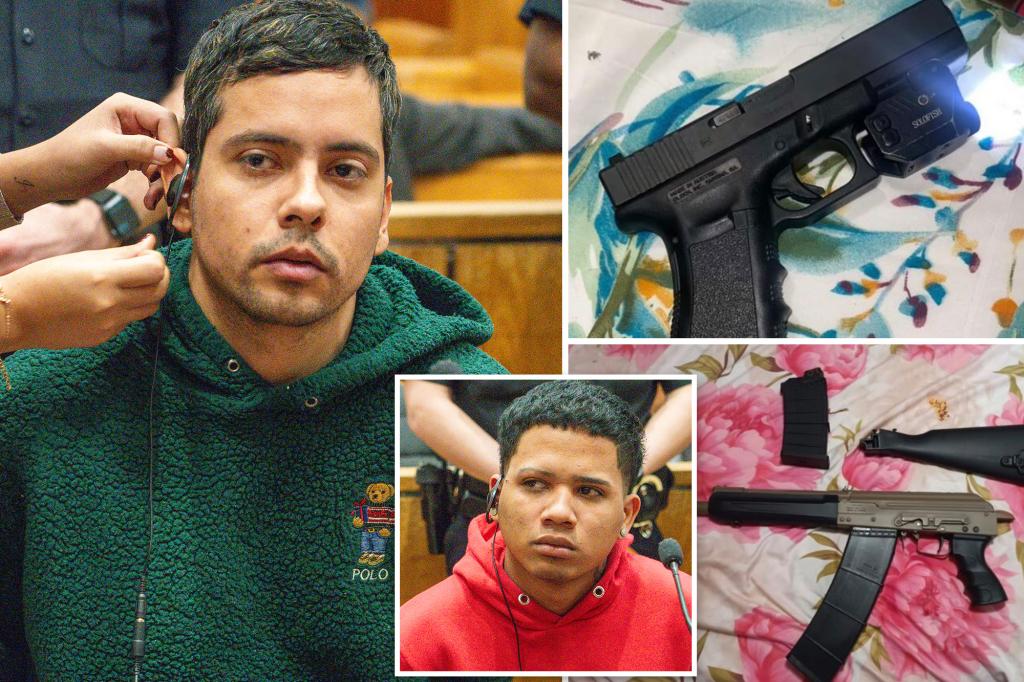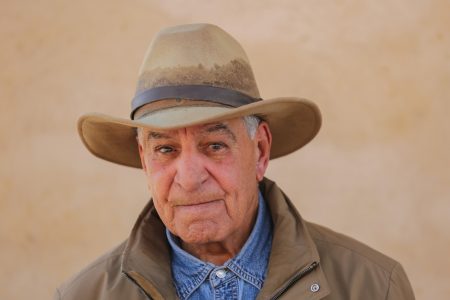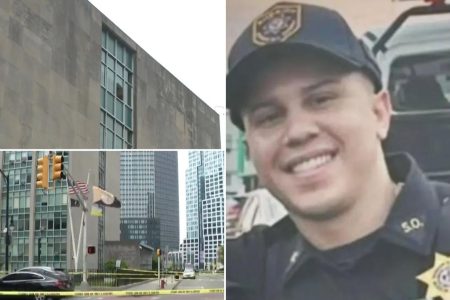This case revolves around a complex web of illegal firearms trafficking allegedly orchestrated by three Venezuelan migrants in New York City. Stefano Pachon, a 21-year-old identified as a leader within the notorious Tren de Aragua gang, stands accused of being the ringleader of this operation. Alongside him are Darwin Figuera, 34, and Yorman Serrano, 31, all of whom have pleaded not guilty to a 31-count indictment detailing their alleged gun trafficking conspiracy. The charges stem from a sprawling investigation initially focused on Victor Parra, a 30-year-old leader of an interstate migrant moped gang, who recently pleaded guilty to grand larceny charges. Evidence gathered during the Parra investigation inadvertently unearthed the alleged gun trafficking ring led by Pachon, marking a significant development in the ongoing efforts to combat illegal firearms proliferation within the city.
The indictment paints a picture of a sophisticated and brazen operation, with Pachon allegedly leveraging encrypted messaging platforms like WhatsApp to negotiate sales and coordinate the distribution of an array of high-powered firearms. Prosecutors contend that Pachon, Figuera, and Serrano, along with a fourth unnamed individual, trafficked a cache of weapons including pistols, shotguns, rifles, and untraceable “ghost guns,” some of which were modified with illegal enhancements like sear switches capable of converting semi-automatic weapons into fully automatic ones. These modifications significantly increase the lethality of the weapons, posing a substantial threat to public safety. The alleged transactions took place across various locations in the Bronx and at a gas station in East Harlem, underscoring the widespread nature of their illicit activities.
The prosecution has highlighted Pachon’s alleged access to a seemingly inexhaustible supply of firearms, raising concerns about the potential sources of these weapons and the broader networks involved in their distribution. Furthermore, Pachon’s alleged continued involvement in criminal activities while out on a bench warrant underscores the challenges faced by law enforcement in curbing illegal gun trafficking. The prosecution emphasized the seriousness of these charges, pointing to the potential consequences of these weapons falling into the wrong hands. The discovery of this alleged trafficking ring represents a significant disruption to the flow of illegal firearms within the city, potentially preventing numerous acts of violence.
The court proceedings have been marked by attempts from the defense to frame Pachon’s case within the context of his status as an asylum seeker. However, Judge Althea Drysdale swiftly rejected this line of argument, emphasizing that seeking asylum does not provide immunity from prosecution for criminal activities. Pachon has been ordered held without bail due to his extensive criminal record, which includes alleged theft from a Queens Sephora. Figuera’s bail has been set at $50,000, while Serrano, accused of attempting to sell his own ghost gun, faces a bail amount of $75,000. The differing bail amounts reflect the perceived level of involvement and potential risk posed by each individual.
The prosecution’s case appears to be built on strong evidence, including communications records, witness testimonies, and potentially physical evidence recovered from the seized firearms. The details revealed in the indictment suggest a meticulous investigation that has pieced together the alleged activities of the trafficking ring. The case against Pachon, Figuera, and Serrano highlights the ongoing challenges posed by illegal gun trafficking, particularly in urban environments. The prevalence of ghost guns, which are untraceable and often assembled from readily available parts, poses a significant hurdle for law enforcement agencies.
The successful prosecution of this case could serve as a deterrent to other potential gun traffickers and send a clear message about the seriousness with which such crimes are viewed. The case also underscores the importance of continued vigilance and collaboration between law enforcement agencies to disrupt the flow of illegal firearms and protect communities from gun violence. The outcome of this trial will be closely watched by both law enforcement and community members concerned about the proliferation of illegal guns. The severity of the charges and the potential sentences faced by the accused underscore the gravity of the situation and the potential consequences for those involved in gun trafficking. The case also serves as a reminder of the complex challenges posed by international criminal networks and the need for international cooperation in addressing these issues.










